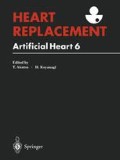Summary
The development of a control method for the totally implantable artificial heart (TAH) to regulate cardiac output according to the change in physiological demand was the goal of this study. The conventional proportional-integral-derivative (PID) controller was used for the automatic regulation of the cardiac output. Furthermore, using a fuzzy gain-tuning algorithm, the PID controller parameters were adaptively tuned to the optimal operating point of the process, which varied with hemodynamic disturbances. To determine the physiological demand, the interventricular pressure (IVP) inside the TAH was used to estimate inflow conditions. The negative peak value of the IVP at each diastolic period has a linear relation to the corresponding atrial pressure. Based on the relationship of atrial pressure to the IVP, the automatic control algorithm proposed regulates the optimal pump rate in terms of sufficient cardiac output delivery under a given venous return. To maintain a well-balanced left and right pump output from the volumetrically coupled, circular moving actuator type TAH, the automatic control also adjusts an asymmetric amount of the moving actuator stroke angle, which provides a different net output of the ventricles. The in vitro performance of the newly developed automatic control method was assessed using a mock circulatory system. Over a physiological range of preload, -3–15 mmHg of right atrial pressure (RAP) and 80–120 mmHg of aortic pressure (AoP), the cardiac output varied from 4.2 to 6.31/min with the left atrial pressure (LAP) maintained below 15 mmHg.
Access this chapter
Tax calculation will be finalised at checkout
Purchases are for personal use only
Preview
Unable to display preview. Download preview PDF.
References
Kim HC, Lee SH, Kim IY, Min BG, Kim JW, Choi JW, Kim JT, Jung DY (1990) Optimal and physiological control for the new moving-actuator type electromechanical total artificial heart. Artif Organs 14:103–105
Choi WW, Kim HC, Min BG (1996) A new automatic cardiac output control algorithm for moving actuator total artificial heart by motor current waveform analysis. Int J Artif Organs 19:189–196
Ziegler JG, Nichols NB (1942) Optimum settings for automatic controllers. Trans ASME 15:827–834
Takahashi Y, Chan CS (1971) Parametereinstellung bei linearen DDC-algorithmen. Regelungstechnik Prozess-Datenverar-beitung 19:237–244
Zhao ZY, Tomizuka M, Isaka S (1993) Fuzzy gain scheduling of the PID controllers. IEEE Trans Systems Man Cybern 23(5):1392–1398
Author information
Authors and Affiliations
Editor information
Editors and Affiliations
Rights and permissions
Copyright information
© 1998 Springer-Verlag Tokyo
About this paper
Cite this paper
Choi, W.W. et al. (1998). An Adaptive Cardiac Output Control for the Total Artificial Heart Using a Self-Tuning Proportional-Integral-Derivative (PID) Controller. In: Akutsu, T., Koyanagi, H. (eds) Heart Replacement. Springer, Tokyo. https://doi.org/10.1007/978-4-431-65921-1_9
Download citation
DOI: https://doi.org/10.1007/978-4-431-65921-1_9
Publisher Name: Springer, Tokyo
Print ISBN: 978-4-431-65923-5
Online ISBN: 978-4-431-65921-1
eBook Packages: Springer Book Archive

